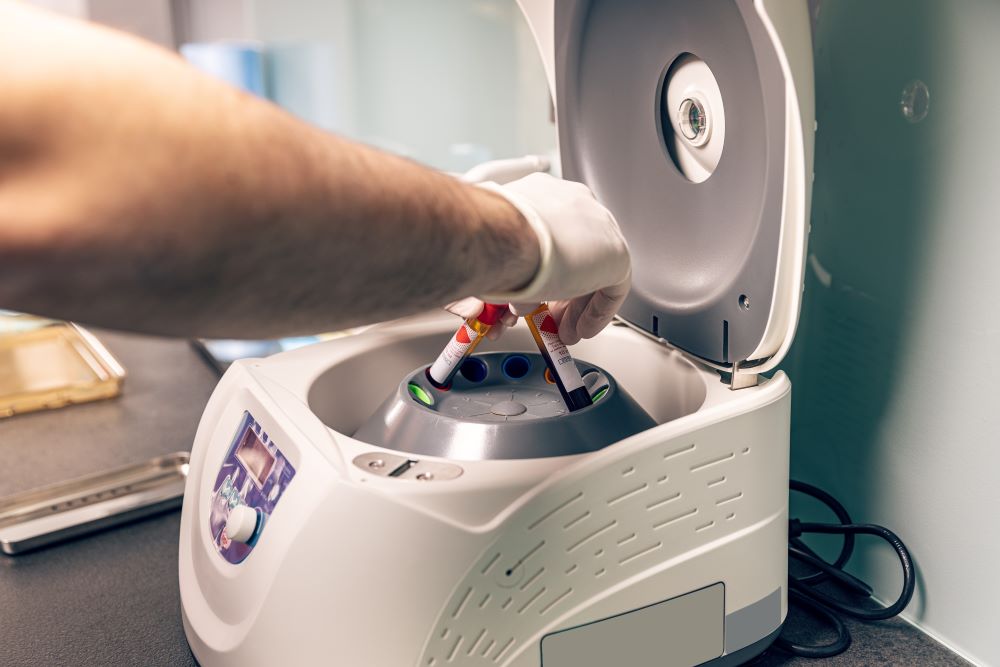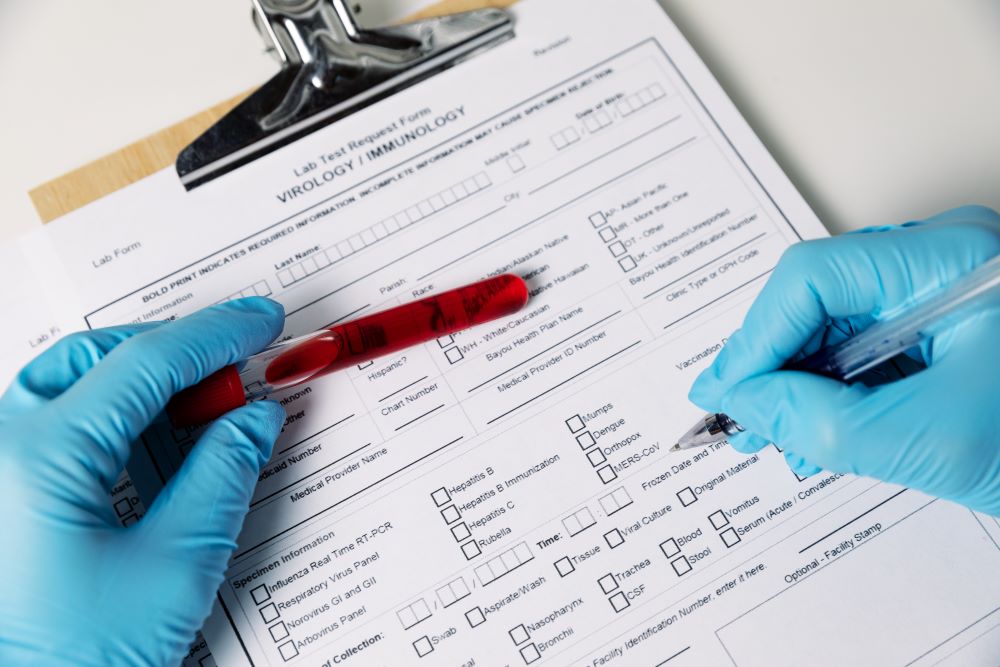What is HCT(Hematocrit) in a Blood Test?

Most of the cells in the human body are red blood cells. Hence, it is very important to keep the RBC levels in check to avoid possible medical disorders. Haematocrit test in a blood test is one of the ways to measure the number of red blood cells in an individual's blood sample.
This test is usually done as part of a complete blood count (CBC) to know if you are okay. Continue reading this article to learn what haematocrit is in a blood test. A high or low HCT level can help diagnose various conditions, such as anaemia, dehydration, or polycythemia, and provides valuable information about your overall health.

Table of Contents

What is HCT in a Blood Test?
The Haematocrit test or HCT in blood test is a test that measures the amount of red blood cells in an individual’s blood. Erythrocytes or red blood cells are responsible for carrying oxygen throughout the human body. Both high and low red blood cell counts can lead to chronic diseases or several medical conditions. The HCT is also known as PCV or Packed-cell Volume test.
A blood test's hematocrit (HCT) shows the fraction of blood made up of red blood cells. It helps check the amount of red blood cells in the bloodstream, which supplies oxygen to all body organs.
Why is a HCT Test Necessary?
A Hematocrit (HCT) test is significant in assessing the proportion of erythrocytes in the patient’s bloodstream, which are crucial for transporting oxygen throughout his/her body. This procedure aids doctors in establishing whether you have conditions like polycythemia, anaemia, or dehydration.
HCT levels tell physicians about the efficiency with which your blood carries oxygen. Therefore, it also helps them determine your general health status to guide treatment decisions or plans. Periodic assessment of HCT must be undertaken mainly among those living with chronic diseases to manage them well, thereby promoting care.
When Should I Get the HCT Test?
You should consider getting the Hematocrit (HCT) test if you're experiencing symptoms like fatigue, weakness, dizziness, or shortness of breath, which could indicate anaemia. It's also recommended if you have a known condition affecting red blood cells, such as chronic kidney disease or certain heart conditions.
Regular monitoring may be necessary if you're undergoing treatment that impacts blood cell production, like chemotherapy. The HCT test may also be part of routine blood work during physical exams, especially if you're at risk for blood disorders.
What is the Procedure for the HCT Test?

The Hematocrit (HCT) test measures the proportion of red blood cells in your blood. A blood sample is drawn from a vein, usually in the arm, to perform the test. The sample is then placed in a centrifuge, which spins the blood at high speed, causing the red blood cells to separate from the plasma.
The percentage of red blood cells is calculated and reported as the hematocrit level. This test helps diagnose conditions like anaemia or polycythemia. It's a quick and routine procedure done in most medical labs.
How to Prepare for a Haematocrit Blood Test?
As this test is usually done with the complete blood count test, no special preparation is required before this test. The physician will conduct the HCT test in his or her clinic and refer you to a lab for the testing.
A lab technician will clean the area and draw blood from it during the test. It is generally done on the arm. After the blood draw, the lab technician will cover the area with a gauge and put on a bandage.
How is HCT Measured in Blood Tests?

Hematocrit (HCT) measures the proportion of red blood cells in your blood. It is usually expressed as a percentage, representing the volume of RBCs over total blood volume.
Your blood sample is centrifuged to measure hematocrit (HCT).
Red blood cells settle at the bottom after centrifuging, while plasma and other components stay on top. HCT value measures the percentage of total blood volume made up of red corpuscles. This figure is generally given as a fraction or a percentage of the whole quantity of blood.
When to Test for HCT in Blood Test?
Doctors might suggest an HCT test if you have anaemia or polycythaemia vera symptoms. Symptoms of anaemia include:
- Fatigue Or Weakness: When experiencing ongoing fatigue or weakness, testing HCT levels can help determine if anaemia or another blood-related issue is the cause.
- Shortness Of Breath: Shortness of breath may indicate a reduced oxygen-carrying capacity in the blood, making an HCT test crucial for diagnosis.
- Headache: Frequent headaches can be a symptom of abnormal red blood cell levels, and an HCT test can help identify underlying blood disorders.
- Cold Feet And Hands: Persistent coldness in your extremities could signal poor circulation, and an HCT test can reveal if low hematocrit levels are to blame.
- Dizziness: Dizziness or lightheadedness might be linked to low hematocrit, as insufficient red blood cells can impair oxygen delivery to the brain.
- Chest Pain: Unexplained chest pain could indicate a heart-related issue or poor blood flow, where an HCT test is essential for further evaluation.
- Pale Skin: Pale or sallow skin may be a sign of anaemia, and testing HCT levels can confirm if red blood cells are deficient.
Symptoms of polycythaemia vera are as follows:
- Double Or Blurred Vision: Changes in vision, such as double or blurred vision, may suggest abnormal HCT levels affecting blood flow and oxygen delivery to the eyes.
- Headache: Frequent or severe headaches can indicate high HCT levels, which might indicate an overproduction of red blood cells, leading to thicker blood
- Shortness Of Breath: Difficulty breathing or shortness of breath may occur if your HCT levels are too low, reducing your blood's oxygen-carrying capacity.
- Itching: Unexplained itching, especially after a shower, can be associated with high HCT levels, a potential indicator of polycythemia.
- Tiredness: Persistent tiredness or fatigue might indicate low HCT levels, commonly seen in anaemia, where there aren’t enough red blood cells to need.
- Flushed Skin: A flushed or reddened complexion could indicate elevated HCT levels, often related to conditions like polycythemia vera.
- Excessive Sweating: Excessive sweating, especially at night, may be linked to abnormal HCT levels, disrupting your body’s normal regulatory processes.
Normal Values for HCT in Blood Tests
The normal values for HCT in blood tests depend on several factors, such as sex, age, altitude where an individual resides, pregnancy, and also on different testing methods. The table illustrated below shows the normal HCT values based on their ages:
Moreover, this range also depends on the altitude in which they live. The normal HCT values are generally higher as the altitude increases. This is because the red blood cells require more oxygen at higher altitudes. The table below shows the normal HCT levels for males and females at higher altitudes:
Symptoms of High HCT

High Hematocrit (HCT) levels can indicate an overproduction of red blood cells, leading to various symptoms. Recognising these symptoms is crucial for diagnosing and managing polycythemia vera or dehydration.
What If HCT in the Blood is High?
Various conditions may be indicated by a blood test that shows the hematocrit (HCT) level higher than normal. A relative increase in HCT occurs due to dehydration and reduced blood volume.
Polycythemia vera, a condition characterised by excessive red blood cell production, can also raise HCT levels. Chronic heart or lung diseases causing long-term low oxygen levels could also lead to increased red blood cell production and higher HCT values.
If the HCT in blood is higher than the normal value, it indicates:
- Dehydration
- Diseases like Polycythaemia vera
- Heart or lung diseases
How to Increase HCT Level?
Individuals with low HCT levels should consult their doctor to learn the cause of their condition and the treatment for the underlying conditions. Further, there are some additional lifestyle changes that can help you increase your HCT levels. These include:
Note: Make sure to consult your doctor before consuming the above-mentioned drugs.
Causes of High HCT
High hematocrit (HCT) levels indicate an increased concentration of red blood cells in the blood. This can occur due to various factors, from dehydration to certain medical conditions. Understanding the causes can help identify underlying health issues.
- Dehydration: When the body loses more fluid than it takes in, blood volume decreases, and hematocrit levels increase relatively. This makes the blood denser, leading to higher HCT values.
- Chronic Hypoxia: Long periods of low oxygen levels, as in chronic obstructive pulmonary disease (COPD) or living at high altitudes, stimulate erythropoiesis. By releasing excess red cells into circulation, these raised hematocrit levels.
- Polycythemia Vera: A rare bone marrow disorder that leads to abnormal overproduction of red blood cells. With abnormally high Hct values, thickened blood increases the risk of clotting, and other complications are formed due to excessive hematopoiesis.
Symptoms of Low HCT
Low Hematocrit (HCT) levels indicate a reduced percentage of red blood cells in the blood, which can impair oxygen delivery to tissues. Recognizing symptoms of low HCT is crucial for diagnosing and managing conditions such as anaemia.
What If HCT in the Blood is Low?
However, if the HCT value is lower than normal, it means:
- Inadequate amount of healthy red blood cells
- Considerably high amounts of white blood cells because of infections, leukaemia, lymphoma, or long-term illness
- Mineral or vitamin deficiency
- Long-term loss of blood
How to Decrease the HCT Level?
An increased HCT level is not good for an individual’s health and thus needs to be decreased. The HCT level in the blood can be decreased in the following ways:
Now that you know what HCT in a blood test means, opt for this test if you encounter any symptoms of blood-related diseases, such as polycythaemia vera or anaemia.
Causes of Low HCT
Low hematocrit levels indicate fewer red blood cells in the blood, which might be due to many different conditions. This reduction can cause symptoms such as tiredness, fatigue, and difficulty breathing. Here are some common causes:
- Anaemia: When the body has too few healthy red blood cells, a person may become anaemic. Iron deficiency, vitamin inadequacy, or chronic diseases may contribute to reduced hematocrit levels.
- Chronic Kidney Disease: Red blood cell production is spurred by a hormone called erythropoietin, produced in the kidneys. This hormone production decreases in people with chronic kidney disease, leading to lower hematocrit levels.
- Bone Marrow Disorders: The inability of the bone marrow to produce red blood cells could result from bone marrow disorders like leukaemia or aplastic anaemia resulting in low hematocrit levels.
- Hemolysis: Hemolysis refers to the breakdown of Red Blood Cells (RBCs). This can occur due to autoimmune diseases, infections, or medication, leading to decreased hematocrit.
- Blood Loss: Significant bleeding caused by trauma, surgery, or internal injuries leads to a lower number of RBCs in one’s body. The immediate loss results in lowered levels of hematocrit.
What Are the Uses of the HCT Test?
An HCT test is generally a part of the CBC or complete blood count, which measures the different components in a blood sample. Haematocrit test helps medical professionals diagnose several blood-related disorders, such as polycythaemia vera or anaemia. Here are a few uses of the HCT test:
- Hematocrit (HCT) test for Anaemia Diagnosis: This diagnostic process is done by observing the number of red blood cells in your blood. When hematocrit is low, there are not enough red blood cells, resulting in fatigue.
- Monitoring Hydration State Using Hematocrit (HCT) test: Hydration status can be assessed by using a hematocrit test. Higher hematocrit levels may indicate dehydration because there is an increase in red blood cells since the plasma is reduced.
- Assessment of Blood Disorders Using HCT Tests: Different diseases affecting people’s blood systems, such as polycythemia, can be examined via HCT tests. When hematocrit is high, it hints at excessive production of red cells, which is problematic.
- Determining How Well Treatment Has Worked Through the HCT Test: Physicians conduct the HCT examination to evaluate how well a patient responds to remedies for diseases. Regular measurement of hematocrit values aids in adjusting dosage levels.
- Indicating What Surgery To Do: There must be a level check-up on HCT before any surgery to establish whether or not it will be safe for a patient with such an RBC count to undergo such procedures without transfusion.
Other Factors that Influence HCT Levels
Various other elements beyond normal health status can influence HCT levels. It is important to know these factors to make a proper diagnosis and manage blood health effectively.
- Hydration Status: Reduced plasma volume causes dehydration, and more RBCs in unitary solution lead to increased HCT levels.
- Altitude: High-altitude living increases the production of red blood cells to counteract reduced oxygen levels, thereby increasing HCT levels.
- Chronic Diseases: Chronic lung or kidney disease may affect red blood cell production, thus interfering with HCT levels.
- Smoking: Over many years, smoking causes higher red blood cell production, resulting in elevated HCT count to make up for low oxygen counts.
- Bone Marrow Disorders: Bone marrow diseases, such as polycythemia vera, lead to abnormally high hematocrit counts.
Understanding Hematocrit (HCT) levels is crucial for assessing your overall blood health and diagnosing various conditions. This test measures the percentage of red blood cells in your blood, providing insights into anaemia, dehydration, and other health issues. Regular monitoring can help detect abnormalities early and guide effective treatment plans. Knowing the normal range and factors affecting HCT levels can help interpret test results accurately.
Protect What Matters - Explore Other Insurance Options














